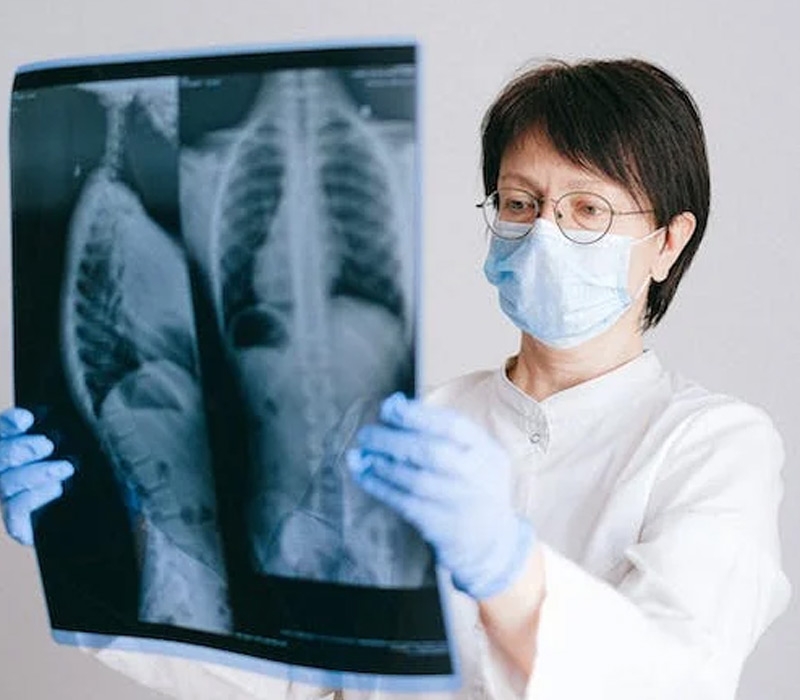
Oncology
Oncology is the medical specialty that deals with the prevention, diagnosis, and treatment of cancer. It encompasses a multidisciplinary approach, involving medical oncologists, surgical oncologists, and radiation oncologists, who work together to provide comprehensive care to individuals affected by cancer.
For Appointment Please Call Phone -9073881874 / 9339754430
Aspects of Oncology
Oncologists may specialize in specific types of cancer or specific treatment modalities.

Prevention
Oncologists are involved in identifying and managing risk factors for cancer to prevent its development. This may include lifestyle modifications, vaccination (e.g., HPV vaccine for cervical cancer prevention), and chemoprevention in some cases.

Diagnosis
Oncologists use various diagnostic tools, such as imaging studies, biopsies, and laboratory tests, to identify and characterize cancer. Accurate diagnosis is crucial for determining the appropriate treatment plan.

Treatment
Oncologists develop and implement treatment plans based on the type and stage of cancer, as well as the individual patient’s health and preferences. Treatment modalities include surgery, chemotherapy, radiation therapy, immunotherapy, hormone therapy, targeted therapy, and stem cell transplantation.

Research
Oncology involves continuous research to advance our understanding of cancer biology, develop new treatment strategies, and improve outcomes for patients. Clinical trials are a crucial component of oncology research.

Supportive Care
Oncologists work with a multidisciplinary team to provide supportive care, including symptom management, pain control, and psychological support, to improve the quality of life for cancer patients and survivors.

Palliative Care
Oncology emphasizes the integration of palliative care, which focuses on improving the quality of life for patients facing serious illnesses. Palliative care is not limited to end-of-life care but is integrated throughout the cancer treatment process.

Improvements in cancer care
Oncologists may specialize in specific types of cancer or specific treatment modalities. For example, medical oncologists primarily use systemic treatments like chemotherapy, radiation oncologists specialize in using radiation therapy, and surgical oncologists perform surgeries to remove tumors.
Given the complexity and diversity of cancer, oncology often involves collaboration among different medical specialties, including pathology, radiology, genetics, and supportive care services. The field is dynamic, with ongoing advancements in research and treatment options contributing to improvements in cancer care.

OncoSurgery
Oncosurgery, or surgical oncology, is a specialized field of surgery that focuses on the surgical management of cancer. Surgeons who specialize in oncosurgery, known as surgical oncologists, are trained to perform surgical procedures for the diagnosis, treatment, and, in some cases, prevention of cancer.
Aspects of Oncosurgery
The treatment plan for a cancer patient often involves a combination of surgery, chemotherapy, radiation therapy, and other supportive therapies, depending on the specific characteristics of the cancer.

Diagnostic Surgery
Surgical oncologists may perform diagnostic procedures, such as biopsies, to obtain tissue samples for laboratory analysis. This helps confirm the presence of cancer, determine its type, and assess its characteristics.

Curative Surgery
The primary goal of oncosurgery is often to remove the cancerous tumor and surrounding tissue to achieve a cure. This may involve removing part or all of an organ or structure affected by cancer.

Debulking Surgery
In cases where complete removal of the tumor is not possible, surgical oncologists may perform debulking surgery to remove as much of the tumor as feasible. This can help reduce the size of the tumor and improve the effectiveness of other treatments like chemotherapy or radiation therapy.

Reconstructive Surgery
Surgical oncologists may work with reconstructive surgeons to restore the appearance and function of affected areas after cancer surgery. This is common in cases where the removal of tissue or organs has a significant impact on a patient’s appearance or function.

Palliative Surgery
In advanced or metastatic cancer cases, oncosurgery may be used for palliative purposes to alleviate symptoms, improve quality of life, or address complications related to the cancer.

Sentinel Lymph Node Biopsy
In certain cancers, surgical oncologists may perform sentinel lymph node biopsy to determine if cancer has spread to nearby lymph nodes. This information helps guide further treatment decisions.

Minimally Invasive Surgery
Advances in surgical techniques, such as laparoscopic and robotic-assisted surgeries, allow for less invasive approaches to cancer surgery, resulting in shorter recovery times and reduced postoperative complications.

combination of surgery
The treatment plan for a cancer patient often involves a combination of surgery, chemotherapy, radiation therapy, and other supportive therapies, depending on the specific characteristics of the cancer.

The Treatment Plan for a Cancer Patient
Collaboration between surgical oncologists and other members of the oncology team, including medical oncologists, radiation oncologists, pathologists, and radiologists, is essential for providing comprehensive cancer care. The treatment plan for a cancer patient often involves a combination of surgery, chemotherapy, radiation therapy, and other supportive therapies, depending on the specific characteristics of the cancer.
Oncosurgery plays a crucial role in the multidisciplinary approach to cancer treatment, aiming to maximize the chances of cure, improve survival, and enhance the overall quality of life for cancer patients.
Our Team Of Doctors In Oncology
For Appointment Ph No – 9073881874 / 9339754430
1. Dr . Anjan Adak MD
Speciality- Consultant Oncologist
Date – Wed



